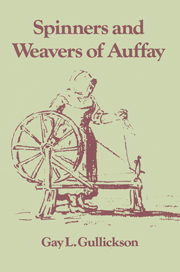 The Spinners and Weavers of Auffay
The Spinners and Weavers of Auffay Book contents
- Frontmatter
- Contents
- Preface
- 1 Introduction
- 2 The pays and the village
- 3 Proto-industrial theory and the pays de Caux
- 4 The golden age of spinning
- 5 Crisis and change in the Caux
- 6 The golden age of cottage weaving
- 7 Marriage and family in proto-industrial Auffay
- 8 Widowhood, remarriage, and the sexual division of labor
- 9 Unwed mothers and their children
- 10 Conclusions: the causes and consequences of proto-industrialization
- Appendix Vital statistics for Auffay
- Notes
- Bibliography
- Index
- Frontmatter
- Contents
- Preface
- 1 Introduction
- 2 The pays and the village
- 3 Proto-industrial theory and the pays de Caux
- 4 The golden age of spinning
- 5 Crisis and change in the Caux
- 6 The golden age of cottage weaving
- 7 Marriage and family in proto-industrial Auffay
- 8 Widowhood, remarriage, and the sexual division of labor
- 9 Unwed mothers and their children
- 10 Conclusions: the causes and consequences of proto-industrialization
- Appendix Vital statistics for Auffay
- Notes
- Bibliography
- Index
Summary
This study began ten years ago when, having survived my Ph.D. exams, I began to search for a dissertation topic. My desire to study changes in women's economic and family roles in connection with some aspect of industrialization gradually developed into a study of cottage industry and agriculture in Normandy, as one research question led to another and I moved from general research in the Bibliotheque Nationale in Paris to more focused study in the Archives Départemental de la Seine-Maritime in Rouen.
Many people helped me along the way, and I am grateful to them all. Joan Wallach Scott, who directed my dissertation, encouraged my interest in the history of women, helped me find my way through the French archives, provided thoughtful and just criticism, discussed ideas, and constantly challenged me to become a better historian. George V. Taylor kindled my interest in French history in his graduate seminars. Franklin Mendels graciously endured my criticisms of proto-industrial theory and supported my work by encouraging me to submit paper proposals for international conferences on proto-industrialization. James Lehning introduced me to the computer, shared his ideas about proto-industrialization, and commented wisely on the manuscript in its final stages. Joseph Carens supported my desire to study history and discussed ideas with me as I worked them through.
- Type
- Chapter
- Information
- The Spinners and Weavers of AuffayRural Industry and the Sexual Division of Labor in a French Village, pp. ix - xPublisher: Cambridge University PressPrint publication year: 1986
